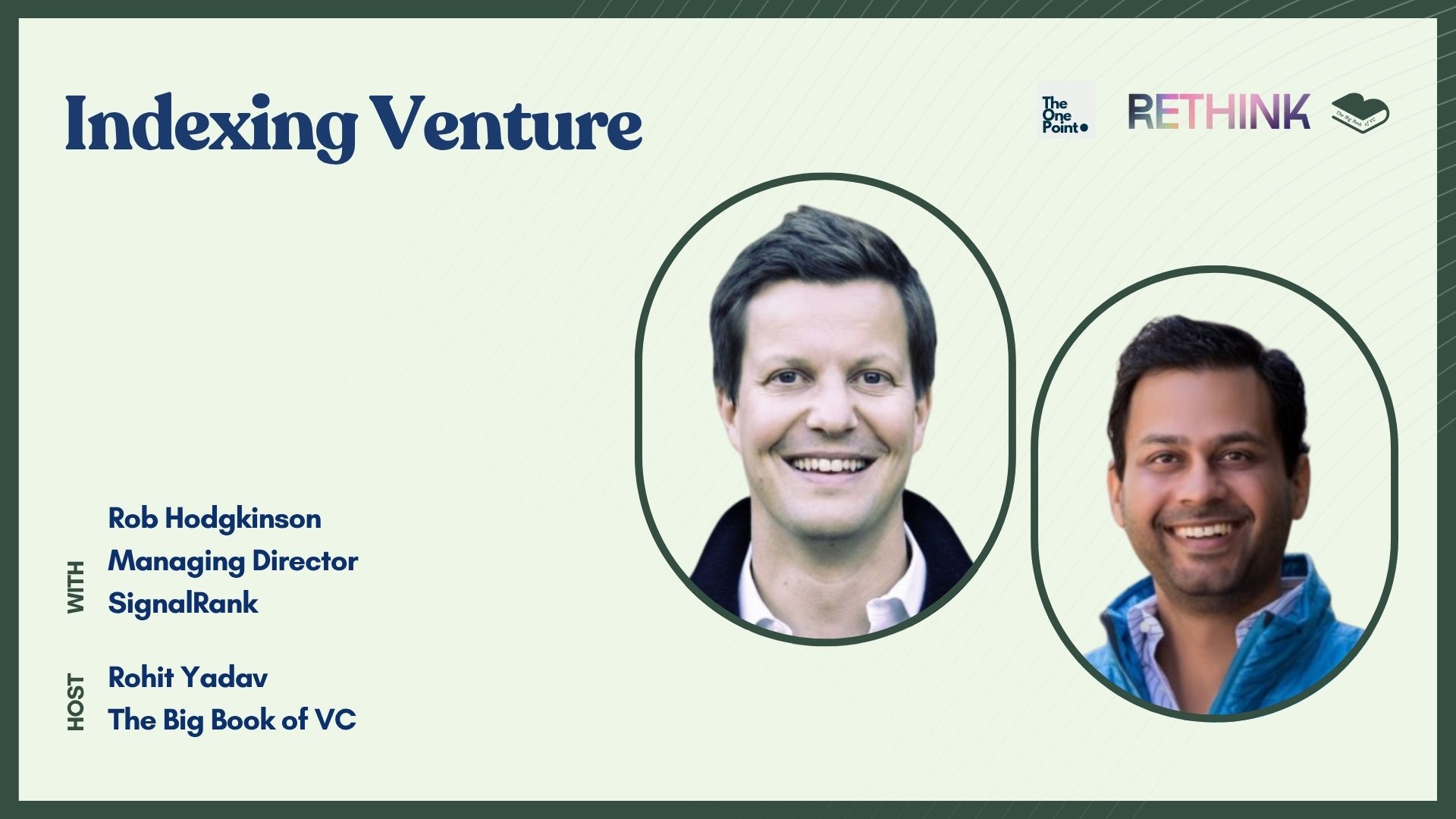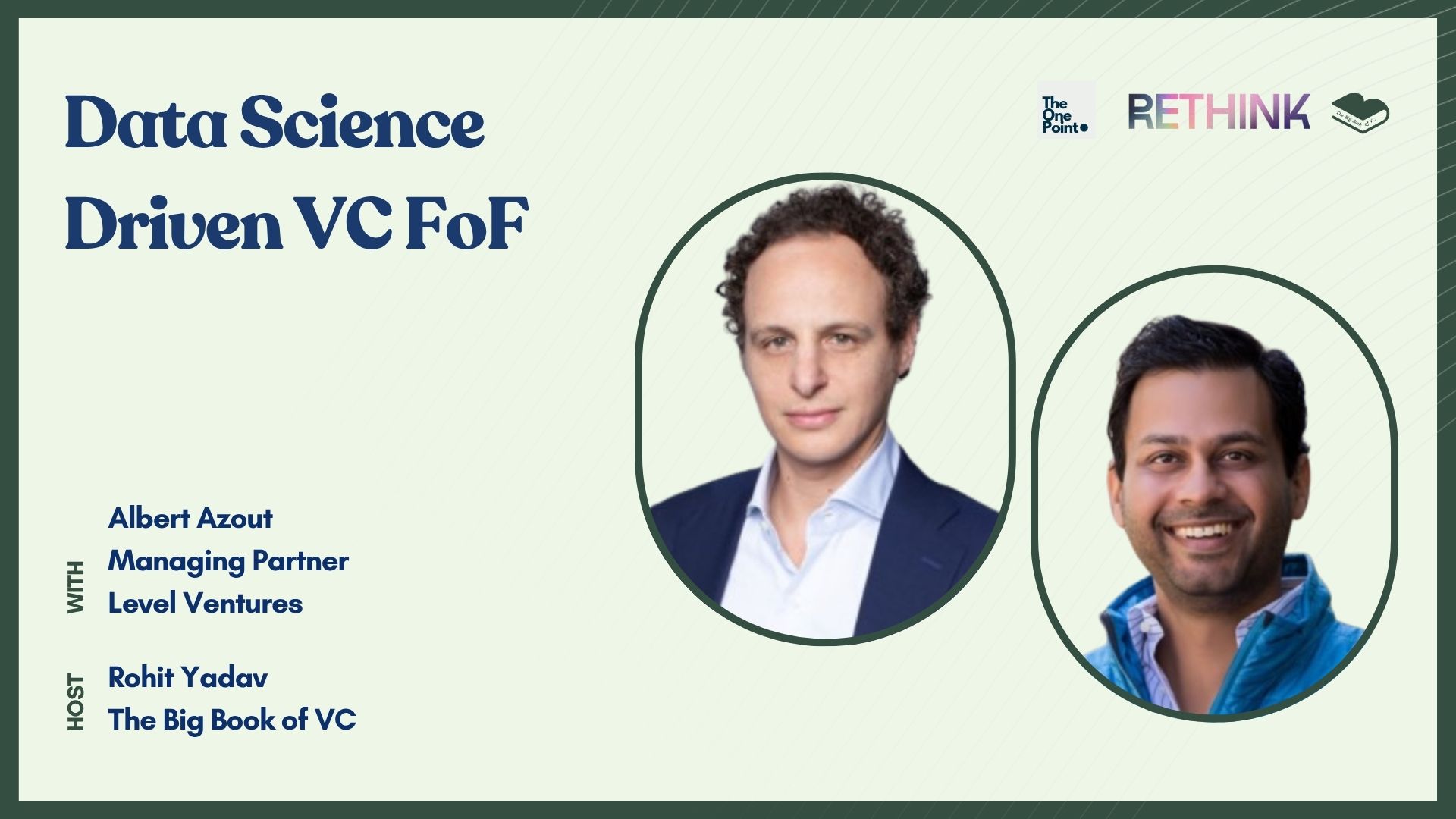Democratization of Venture Capital (OurCrowd Story)
Snapshot of interview with Cali Chill from OurCrowd
Rohit Yadav: Welcome to the One Point podcast. Today, we’re diving deep into the democratization of venture capital and more, with Cali Chill, Chief Investment Officer at OurCrowd. Cali, great to have you here.
Cali Chill: Thanks, Rohit. Great to be here.
Rohit: Let’s start with OurCrowd. What exactly is it?
Cali: OurCrowd is a platform that allows accredited investors to participate in venture capital. It was founded in 2013 by Jon Medved in Jerusalem. The idea was to open up VC investing to people who might only want to invest $10,000 in a startup or $50,000 in a venture fund, rather than millions.
Rohit: Why focus on accredited investors rather than family offices or institutions?
Cali: The vision was to widen access to the VC asset class. While we now work with family offices and some institutional investors, the goal was to enable individual accredited investors—those meeting thresholds like $200,000 in annual income or $1M in net worth—to invest alongside top-tier VCs. This approach democratizes access and builds a network of investors who bring not just capital, but commercial connections and strategic value to portfolio companies.
Rohit: How large is the OurCrowd community and what does your portfolio look like?
Cali: Over 240,000 people have signed up from more than 100 countries. Around 8,000 of them have invested. The platform started in Israel, then expanded globally. About 50% of our investors are from the U.S., 10% from Israel, and the rest from Europe, Asia, Australia, South America, and elsewhere.
Our portfolio is hyper-diversified—by geography, sector, and stage. We’re active in cyber, health tech, mobility, quantum, consumer electronics, and more. We've backed startups from seed to pre-IPO, in Israel, the U.S., Europe, and Asia.
Rohit: And how big is your AuM?
Cali: Just shy of $2.4 billion. About two-thirds of that is in startups and one-third in funds. Initially, we focused on startups, but from 2016 onward, we also added fund products—including index funds like OC50 and third-party VC funds.
Rohit: Can you give us some highlights from the startup and fund portfolios?
Cali: Sure. On the startup side, one of our proudest investments is BioCatch, a behavioral biometrics company that helps banks prevent fraud. We invested when it was valued at around $30–40 million. It’s now a unicorn. Another is ThetaRay, a cyber startup we backed early and continue to support actively—we’re on the board and very involved.
We also offer access deals. These are later-stage companies like OpenAI or Databricks—deals that are hard to get into unless you’re Sequoia or Andreessen. We access these through SPVs and offer pieces to our investors.
On the fund side, we’ve backed Rebel Fund, which sits on top of Y Combinator deal flow. They use AI to cherry-pick startups before demo day. Another is Harpoon Ventures, led by Larsen Jensen. We’re also in Draper Associates—Tim Draper’s fund—as well as Valerian Space Ventures, which focuses on dual-use space tech.
Rohit: PitchBook ranked OurCrowd as Israel’s most active VC investor. That must come with challenges too?
Cali: Definitely. Being a platform means we do a lot of deals. But that means some won’t work out. If an investor backs only one or two companies and those fail, they’re disappointed. We always recommend diversifying—across sectors, stages, and products.
Also, we don’t guarantee how much we’ll raise for each deal. If a company expects us to bring in $3 million and we only raise $2 million, that can create tension. But the flip side is that we can often bring in fresh follow-on capital more easily than traditional VCs by going back to our investor base.
Rohit: Let’s talk democratization. How have LP structures evolved in the last decade?
Cali: We've seen an explosion in platforms like AngelList, Republic, SeedInvest, and FundersClub—some of which even allow non-accredited investors. The LP pool is becoming smaller, broader, and more global. We've also seen traditional institutions begin to work with platforms like ours.
The wealth is out there—$90 trillion globally—and people are looking for smart ways to deploy it. Now even elite funds like Lightspeed are open to raising via platforms like OurCrowd. That wouldn’t have happened 10 years ago.
Rohit: Why is democratization essential for LPs?
Cali: Because otherwise, many would never have access. I had a friend recently say, “Cali, get me into a drone company—I’ll put in $20,000.” Without OurCrowd, that’s not happening. We allow people to place smaller bets in highly sought-after, high-impact companies.
Rohit: So how is OurCrowd winning in this space?
Cali: First, we had a head start—founded in 2013. Second, we focus on quality. Early on, we chased AuM and did all the deals we could. Now we’re much more selective. We aim to offer not just access, but quality access—opportunities investors can’t get elsewhere.
We also bring creative products to market. For example, we recently participated in a continuation vehicle from NEA that included companies like Databricks and Plaid. That’s a highly exclusive opportunity, and we made it accessible.
Rohit: Let’s talk risk. What risks do accredited investors on your platform think about?
Cali: Venture is inherently risky—that’s the “venture” in venture capital. We make that clear. Every deal on OurCrowd comes with detailed documentation, including our take on the company, its strengths, and the risks involved.
Many of our investors are doctors, lawyers, or businesspeople who may not be experienced in private markets, so we invest heavily in education—webinars, content, and risk disclosures—so they can make informed decisions.
Rohit: You’ve backed over 58 funds. What’s your fund selection philosophy?
Cali: We have three buckets: internal funds, third-party VC funds, and alternative strategies like PE or venture lending. Our third-party fund strategy has been especially successful.
We back both emerging managers—like Rebel or Soma Capital—and established brands like Draper Associates and Lightspeed. With emerging managers, we do deep diligence and often get better economics. With brands like Tim Draper, it’s more about the name recognition and proven track record.
Rohit: What differentiates OurCrowd from other fund-of-funds?
Cali: We’re not a traditional fund-of-funds. Those raise a pool and invest in 15–20 funds, and LPs don’t get to choose. We offer a platform model where you pick exactly what you want. If you’re into space tech, go for Valerian. If you want YC exposure, go for Rebel. And if you want diversification, we’re now offering Covest.
Rohit: Let’s talk about Co-Vest. What is it?
Cali: Co-Vest is our new hybrid product. It will be a sizable fund—split 50/50 between VC funds investments (FoF model) and co-investments in startups sourced from those funds. It gives investors exposure to both sides of OurCrowd—funds and startups—in areas like AI, fintech, quantum, and cyber.
We’re waiving management fees on the fund side and only charging on the startup co-investment side, which makes the economics very compelling.
Rohit: Shifting gears—how has geopolitics shaped VC over the last few years?
Cali: In many ways. The Russia-Ukraine war led to sanctions and onboarding issues. U.S.-China tensions have triggered an AI race. For example, someone who invested in Anthropic might worry when DeepSeek emerges in China, claiming to do the same for a fraction of the cost.
Closer to home, the Israel-Iran war was a pivotal moment. Israel’s tech superiority was on full display. We’ve backed companies like Empress, which powers the Iron Dome, and a laser-based Iron Beam system. Geopolitics is driving new tech development—especially in defense, where we’re now more active than before.
Rohit: Do these geopolitical trends also affect your U.S. investments?
Cali: Yes, though in different ways. For instance, supply chain vulnerabilities post-Ukraine have global repercussions. Tariffs and regulatory shifts in the U.S. can affect business models and cross-border investments. So geopolitics isn’t just a regional issue—it’s global and it impacts fund strategy, deal flow, and investor sentiment.
Rohit: Cali, this has been a phenomenal conversation. We covered OurCrowd, democratization, fund investing, geopolitics, and more. Thanks for joining.
Cali: My pleasure, Rohit. Thanks for having me.



.svg)




